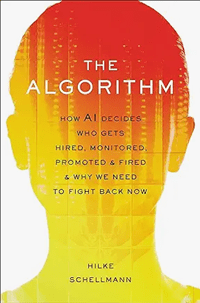Question
I’ve successfully searched for work for over 20 years. I always lead with what I can do for an employer and with my ability to learn quickly, and I get hired. But it’s getting harder to find a manager to explain that to! Now it’s ATS this and ATS that. Applicant Tracking Systems don’t ask what you can do or what you can learn. They just want you to dump your data into the bit bucket so they can sort you out. But data about your experience is not useful information until a qualified person reviews it, and the ATS is designed to keep qualified judges away from you as long as possible! No wonder it takes thousands of applicants to fill a job. You’ve written a lot about ATSes. Please give me your low-down.
Nick’s Reply
 My good buddy Paul Solman at PBS NewsHour shared with me the most concise description of Applicant Tracking Systems that I’ve seen, an article by Wahyd Vannoni, What are Applicant Tracking Systems? How Do They Rank Potential Candidates? It’s nice and brief and although it wasn’t Vannoni’s intent, it highlights everything that’s wrong with ATSes and how they are used. (It also includes a list of ATS vendors. Bet you didn’t know there are so many!)
My good buddy Paul Solman at PBS NewsHour shared with me the most concise description of Applicant Tracking Systems that I’ve seen, an article by Wahyd Vannoni, What are Applicant Tracking Systems? How Do They Rank Potential Candidates? It’s nice and brief and although it wasn’t Vannoni’s intent, it highlights everything that’s wrong with ATSes and how they are used. (It also includes a list of ATS vendors. Bet you didn’t know there are so many!)
I think you put your finger on the fatal problem: Relying on an ATS to select and hire workers isolates the job applicant from the person best qualified to judge them – the hiring manager. That’s how employers miss some of the best candidates and why they frequently interview and hire the wrong ones. It’s why you’re frustrated.
It’s virtually impossible to apply for a job today without encountering an ATS, so it’s worth taking a close look at what we subject ourselves to when we let an ATS process our data. Let’s look at Vannoni’s key points about what ATSes are and how they, uh, work.
Lie #1: An ATS manages the entire hiring process.
“An Applicant Tracking System (ATS) is a software tool that streamlines the recruitment process for companies. It is designed to manage the entire hiring process, from posting job openings to screening candidates to scheduling interviews and hiring.”
If the promise of the ATS were fulfilled, who would need an HR department? That’s what the text implies. We know it’s not true.
Companies take their most important competitive edge — the ability to hire the best people — and turn it over to be managed by an ATS, which can be generously called a bag of algorithms that don’t work well, if at all.
Investigative journalist Hilke Schellmann has laid this out compellingly in her book, The Algorithm. (See The A.I. Job Interview: You need to know why it’s crap.) These systems are biased, indefensibly reductionist, and about as smart as a cocker spaniel pup that pees exactly where it peed last time because the spot smells like pee. In today’s competitive hiring market, ATSes can’t deliver as promised. If they did, we wouldn’t need HR.
Lie #2: An ATS is a database of candidate information that makes job matches.
“At its core, an ATS is a database that collects and stores candidate information. When a job opening is posted, the ATS will scan resumes and cover letters for relevant keywords and phrases, and then rank the candidates based on how closely their skills and experience match the job requirements.”
A database does not store information. It stores data. (“Data on its own has no meaning. It only takes on meaning and becomes information when it is interpreted.” -University of Cambridge) More accurately, data collected by an ATS is strings of ASCII symbols that have no inherent meaning like words do. It is a very simple pattern-matching system made to look “smart” because the computers behind it can process staggering numbers of patterns faster than we can conceive.
Matches are made based on how closely one pattern matches another. There is no information, there are no skills, there is no experience, and other than a list of ASCII characters masquerading as semantic entities we call words — and there is no “job requirement.” This is precisely why ATSes can process millions of candidate database records per second. They need millions of those records in order to demonstrate that pattern-matching can sometimes work.
Try an experiment: Give the ATS just 5 records that describe 5 people accurately but include none of the magic ASCII strings and the ATS fails. Try it with a million people and it will perform like a boiler room of monkeys tapping on old Royal typewriters.
Wharton researcher Peter Cappelli tells the story of a corporate executive who asked why, after 14,000 engineers applied to fill a couple of routine engineering jobs, his HR department’s ATS deemed none of them worth interviewing. I’ll bet any engineering manager could screen 20 of those applications, interview three and recommend a good one to hire that would perform well.
Lie #3: An ATS removes bias from hiring and ensures fairness.
“In addition to streamlining the recruitment process, an ATS can also help companies stay compliant with Equal Employment Opportunity (EEO) laws by ensuring that each candidate is evaluated fairly and consistently. It can also help to reduce bias in the hiring process by removing personal information such as name, address, and age from the initial screening process.”
Here’s where naivete and ignorance about the ATS industry shine forth. I’ll direct you again to Schellmann’s book, and I can show you 10 more links like this: Amazon scraps secret AI recruiting tool that showed bias against women.
ATS and AI vendors market the hell out of “Eliminates bias!” We now know that algorithms can actually introduce more biases.
Lie #4: An ATS saves time and money and results in better hires.
“Overall, an ATS is a powerful tool that can save companies time and money by automating many of the time-consuming tasks associated with recruiting. By using an ATS, companies can more easily identify and attract top talent, ultimately leading to better hires and a stronger workforce.”
First, saving time and money and automating tasks tells us nothing about the single most important metric in a business endeavor like hiring: accuracy. ATSes sacrifice accuracy for volume. But more is not better.
You can build a machine to crush 10 tons of stone per hour, but how much will you pay for one of these if the output you want is wheat flour? ATSes do not produce hires; they produce matches of ASCII strings. No reading between the lines is possible until all of those 14,000 engineer applicants have already been rejected.
Lie #5: If we keep saying it, ATSes will actually work!
Vannoni did a nice job in his brief survey article about ATSes. He clearly gauged it for readers who want the basics. That’s why there’s not a word about the impacts on the job applicants who are subjected to the wonders of ATSes that save companies money and time.
But I do have a beef with Vannoni because he should know better. He’s a communications consultant and marketing professor. Having an MBA, it’s frankly stunning that he doesn’t apply the test all MBA programs teach their students: Where’s the outcomes analysis?
What does it matter how clever the ATS appears if we’re not going to discuss whether it works and how well? But we forget how good marketers are at selling benefits. That is, it’s all about what you can get a market to swallow.
- It manages the whole hiring process!
- It matches jobs with the right candidates!
- It eliminates bias and ensures legal compliance!
- It saves money and delivers better hires!
While I was writing for NewsHour, I interviewed CareerBuilder, one of the leading job boards. I asked about outcomes. What’s the job-filling and job-finding success rate? 57% of all jobs are filled by CareerBuilder, they said. Can I see the data? Well, we don’t release that. 57%. I’m still laughing.
My low-down is that I’ve had a standing challenge to ATS and job board companies: Where is your outcomes analysis? Show us the data about results. None have done it.
What lies have you been told about ATSes and how they’re going to help employers hire you? Do you have examples of how ATSes work or don’t work?
: :




 That depends on who you’re calling.
That depends on who you’re calling. Think. Upon introducing yourself to a manager who knows nothing about you and who has never seen your resume, what could you say to make the manager want to meet you — and hire you? Then come join us in the Comments section below to share your ideas about How to Say It!
Think. Upon introducing yourself to a manager who knows nothing about you and who has never seen your resume, what could you say to make the manager want to meet you — and hire you? Then come join us in the Comments section below to share your ideas about How to Say It!
 Sorry, I don’t review resumes, ATS-formatted or otherwise. It’s not my intent to berate or ridicule you but you do, after all, work in HR. How can you not know how the ATS game is played? The house wins, you lose. The house is the Employment System — ATS vendors and the job boards (and any employers that use ATSes). The rest of us are the gamblers.
Sorry, I don’t review resumes, ATS-formatted or otherwise. It’s not my intent to berate or ridicule you but you do, after all, work in HR. How can you not know how the ATS game is played? The house wins, you lose. The house is the Employment System — ATS vendors and the job boards (and any employers that use ATSes). The rest of us are the gamblers.
 You have two choices: bring this to a head, or let it alone. My advice is to let it alone. Let’s explore the other option, then I’ll explain why I think you should leave it alone
You have two choices: bring this to a head, or let it alone. My advice is to let it alone. Let’s explore the other option, then I’ll explain why I think you should leave it alone
 If the manager talked a blue streak during your interview, I think the manager should let someone else do the interviewing.
If the manager talked a blue streak during your interview, I think the manager should let someone else do the interviewing.
 Today these highly questionable — but apparently profitable — HR technology systems proliferate. They purport to interview and assess job applicants, search social media to measure employee loyalty, and score people’s personality — all without ever meeting anyone. Among these companies: HireVue, IBM, Humantic AI, Fama, Arctic Shores, Good Egg, Ferretly, Intelligo, Predictim and many more. They are taking over HR.
Today these highly questionable — but apparently profitable — HR technology systems proliferate. They purport to interview and assess job applicants, search social media to measure employee loyalty, and score people’s personality — all without ever meeting anyone. Among these companies: HireVue, IBM, Humantic AI, Fama, Arctic Shores, Good Egg, Ferretly, Intelligo, Predictim and many more. They are taking over HR.

 Make time!
Make time!
 He also volunteered to help me in my job search with his industry contacts! He told me to wait while he called two managers he knows in other companies and suggested they should meet me! At first I thought, how insane, but then I realized how smart it is! This is a very busy person who travels non-stop and has all of the same reasons that everyone else has for not following up with people. Yet he made the time for me.
He also volunteered to help me in my job search with his industry contacts! He told me to wait while he called two managers he knows in other companies and suggested they should meet me! At first I thought, how insane, but then I realized how smart it is! This is a very busy person who travels non-stop and has all of the same reasons that everyone else has for not following up with people. Yet he made the time for me.
 My most recent opportunity left me with the impression that I would be invited for a site visit. But after a full 30 minutes of discussion on the phone, they e-mailed me that my job candidacy “will not proceed.” I have a nagging feeling that they don’t really know why.
My most recent opportunity left me with the impression that I would be invited for a site visit. But after a full 30 minutes of discussion on the phone, they e-mailed me that my job candidacy “will not proceed.” I have a nagging feeling that they don’t really know why.
 You’re on board now. Given that you relocated, there’s no easy way to turn back, unless you want to move back to your old company, and they’re willing to have you. That’s doubtful. Let’s discuss what to do now, then we’ll explore why this may have happened and how to avoid a repeat!
You’re on board now. Given that you relocated, there’s no easy way to turn back, unless you want to move back to your old company, and they’re willing to have you. That’s doubtful. Let’s discuss what to do now, then we’ll explore why this may have happened and how to avoid a repeat!